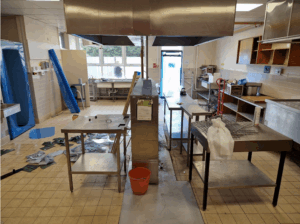Site supervisor fined after exposing school pupils to asbestos
A construction site supervisor has been fined after he exposed primary school pupils and staff to asbestos during renovation work.
Adrian Barraclough was working as a site supervisor during the refurbishment of kitchen facilities at Holy Family Catholic Primary School in Bristol.

During the works on 13 May 2023, the 54-year-old cut through asbestos insulating board using a circular saw. His actions resulted in asbestos fibres spreading throughout the school hall, which was subsequently used for two days by pupils and staff.

An investigation by the Health and Safety Executive (HSE) found that Barraclough failed to follow his asbestos awareness training, including clear instructions not to disturb the wall. Following an asbestos survey, the wall was due to be checked by a licensed asbestos contractor prior to removal to clarify if asbestos was present.
HSE’s has two campaigns “Asbestos and You” and “Asbestos Your Duty” reminding tradespeople about the dangers of asbestos and the importance of working safely with it, also to reach those responsible for the maintenance and repair of non-domestic buildings.

The regulator also provides comprehensive guidance for workers and employers about working safely with asbestos on its website. This includes information on how to identify asbestos, what to do if you find it, and the appropriate safety measures needed when working with or around asbestos-containing materials. Workers in trades such as construction, maintenance, demolition and installation are particularly at risk and should ensure they have appropriate training before starting work that might disturb asbestos.
Adrian Barraclough, of Green Lane, Frome, pleaded guilty to breaching Section 7(a) of the Health and Safety at Work etc Act 1974. He was fined £1,800 and ordered to pay a £720 victim surcharge and £4,000 in costs at Bristol Magistrates’ Court on 12 June 2025 – a total financial penalty of £6,520.
HSE inspector Ian Whittles said: “Every year around 5,000 people die from asbestos-related diseases, often taking decades to develop symptoms. In this case, wholly unacceptable exposure to asbestos fibres occurred as a result of an individual employee not following instructions and procedures designed to prevent such occurrences.”
This HSE prosecution was brought by HSE enforcement lawyer Karen Park and paralegal Imogen Issac.
Further information
- The Health and Safety Executive (HSE) is Britain’s national regulator for workplace health and safety. We are dedicated to protecting people and places, and helping everyone lead safer and healthier lives.
- More information about the legislation referred to in this case is available.
- Further details on the latest HSE news releases are available.
- Relevant guidance can be found here: Introduction to asbestos safety: Overview – HSE.
- HSE does not pass sentences, set guidelines or collect any fines imposed. Relevant sentencing guidelines must be followed unless the court is satisfied that it would be contrary to the interests of justice to do so. The sentencing guidelines for health and safety offences can be found here.